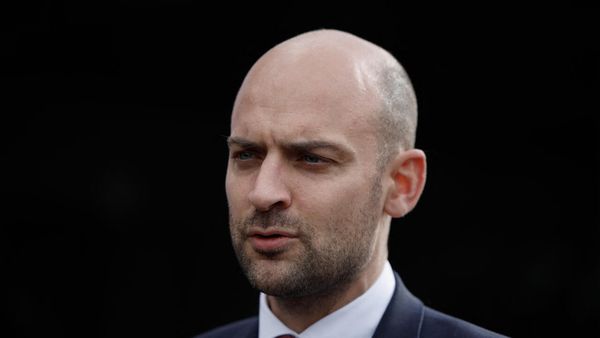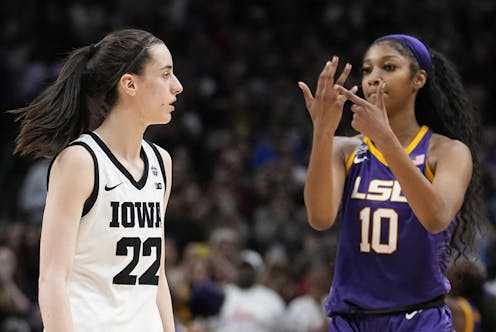
Louisiana State University’s women’s basketball team has been crowned 2023 NCAA champions. The championship game was the most watched in women’s NCAA basketball history with 9.9 million viewers tuning in.
Toward the end of the game, Angel Reese from LSU celebrated by waving her hand in front of her face and pointing to her ring finger. Her gestures were largely directed towards the opposing team’s Caitlin Clark from the University of Iowa.
Reese was criticized by observers who said the gestures were “classless” and unsportsmanlike. This despite Clark having made a similar gesture earlier in the competition.
The controversy surrounding this act overshadowed LSU’s win. The negative public discourse once again revealed society’s and the media’s double standards when it comes to Black women in sport.
Black women came to play hard and showcase their skills and athleticism. They came to demonstrate clearly and unequivocally, the legitimacy of playing sports as Black women. Black women athletes deserve to represent their way of being in the world even if it disrupts established conventions that have not been set by them.
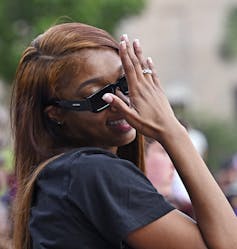
Expectations of behaviour
As athletes, Black girls and women have always emerged as trailblazers in their particular sports — whether in track and field, tennis, figure skating, swimming or basketball.
Whenever society and the sports world tries to fragment their Blackness along racial and gender lines, they actively resist the incomplete and inaccurate representations. Black women athletes have learned to authentically celebrate their achievements and have found ways to push back against ongoing criticism of their looks or their alleged lack of femininity and professionalism.
For far too long, Black girls and women have been made to conform to the largely white and very male-centred ideas about how sport should be played and how Black athletes ought to present themselves. Sport has, in fact, been one of the many vehicles of perpetuating white supremacy by imposing normative expectations of behaviour and conduct.
I am a Black feminist academic. My research and scholarship aims to centre Black girls and women stories and lived experiences. One of which is Black girlhood and sports culture.
Black feminist thought addresses the ways that race, class, gender, sexuality and other sociocultural factors combine to create oppression for Black women and girls. As a Black woman and basketball player, I was welcomed to participate, but I was instructed to play in a particular way. I could feel the pain and discomfort arising when displaying my Blackness.
Often challenged for the ways I spoke or performed both on and off the basketball court, I could hear and feel the unspoken words of “please, don’t make a scene; don’t present us as other.”
Sport has been enormously meaningful in my life, but for many Black girls and women, it has not been liberating or a space of authenticity. It remains a constant reminder that we are not allowed to exist as our whole selves.
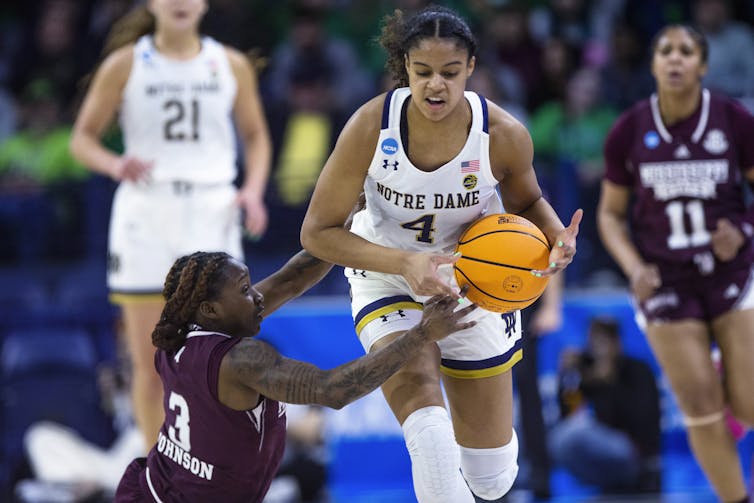
Femininity and professionalism in sport
Controversies surrounding a single moment can be magnified for Black women and girl athletes. There is often an added layer of being penalized more harshly for the way they express themselves. Black women athletes are held to unrealistic standards by society in the way they must react to wins, losses or disappointments.
Dehumanizing Black women in sports is nothing new, it has been the lifelong struggle of other great athletes, none more prominent than Serena Williams.
Read more: That racist caricature of Serena Williams makes me so angry
Playing the game “the right way” is always a code used to manipulate, reconstruct and ultimately whitewash how Black girls and women play sports.
Unfortunately the portrayal of Angel Reese versus her white counterpart by some commentators and spectators reminds us of the stereotype that Black young women athletes must contend with. The rhetoric and harsh criticism weaponized against this Black woman athlete was in direct opposition to the treatment received by her white counterpart.
Sadly, coded language, messaging and marketing have always been at the heart of exclusion that parades as inclusion. These kinds of codes maintain the polite posture of sport norms while ensuring a critical gaze is permanently fixed on Black women as they assert themselves in sports.
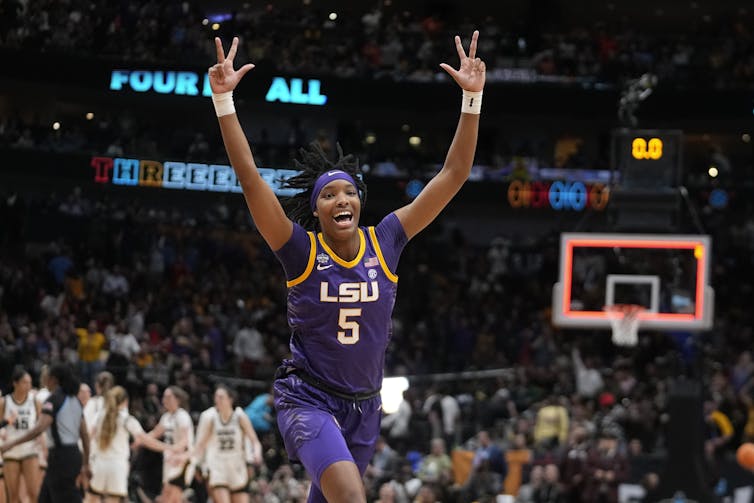
Black girls and women being their authentic selves
Black women mitigate, resist and disrupt the patriarchal structures that have always been imposed on them in sport. They continue to expand their presence in sport in a way that reflects who they are as individuals and as athletes. When they do so, they find collective ways to support each other and allow for new spaces of inclusiveness to emerge.
The hair styles and colourful tresses are no longer adjusted to meet European beauty standards. Black athletes embody their identities through their fashion choices and as a way to respond to society rejecting parts of their identity.
The lyrical combination of movements, gestures, body language and demeanour authentically represents Black girls and women’s beauty, strength and courage standing in their full power and bringing all aspects of their background to sports.
Women athletes continue to face inequities when it comes to how they are under-funded and underpaid. We must challenge sexism in sports and how women’s accomplishments are rendered secondary to those of men.
The discrimination and anti-Black racism Black girls and women experience in sports must be highlighted. However, we must also recognize how Black women continue to assert themselves and lean into their Blackness as athletes.
As a former competitive athlete, I am reminded that by being ourselves we ultimately make everything better for our communities. LSU’s win is my victory too and a victory for all the Black girls and women who play sports.
Treisha Hylton does not work for, consult, own shares in or receive funding from any company or organization that would benefit from this article, and has disclosed no relevant affiliations beyond their academic appointment.
This article was originally published on The Conversation. Read the original article.



